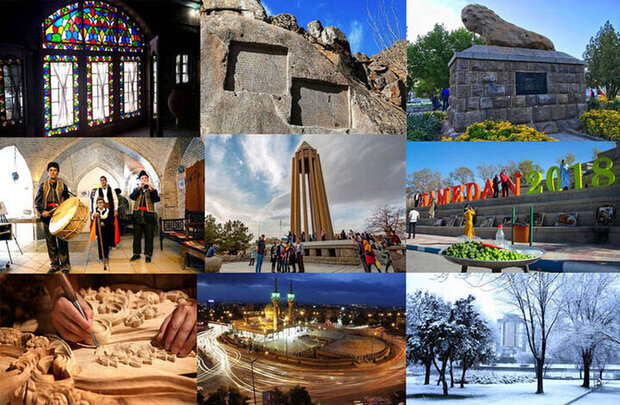Hamedan’s attractions draw in 900,000 visitors
Dating historical roots back to the time of Medes, Hamedan’s attractions have received approximately 900,000 visits from domestic travelers along with hundreds of inbound tourists throughout the Nowruz holidays.

Providing a comprehensive overview of the number of visits to the province’s places of interest, Hamedan’s director-general of tourism outlined that from March 16 to April 5, more than 909,000 tourists explored the province’s allure.
Mohsen Masoum-Alizadeh further elaborated on the accommodation statistics of tourists, stating that throughout the spring holidays, 97,000 overnight stays were recorded across the province
As the countdown has started to welcome Eid al-Fitr holidays only a week after Nowroz vacations, he outlined that the travel services across the province have been extended till the end of the upcoming holidays with an eye toward hosting holidaymakers in the best possible way.
“We are expecting the upsurge in the level of arrivals to the province in the course of the Eid al-Fitr holidays,” Masoum-Alizadeh noted, “Build on the recent Nowruz statistics.”
Pointing to the accessible location of Hamedan which is considered close to Iran’s capital, the official expressed optimism towards welcoming the tourists more than ever.
Detailing the preparedness level in terms of catering to travelers deservedly, Masoum-Alizadeh pointed to the coordinating efforts taken by different organizations.
Regarding the inspections, the Director-General mentioned that hundreds of monitoring visits to tourism facilities were conducted to ensure holidaymakers were being catered to in the spring holidays.
Believed to be among the oldest Iranian cities, Hamedan dating its historical roots back to the 700 BC, brings to light how precious is the city to every tourist who wants to immerse themselves in the rich atmosphere of the area.
As the first capital of Iran from 2550 to 2700 years ago, the ancient city of Hamedan was founded by the first king of the Medes and was called Hegmataneh which means “place of aggregation” in ancient language.
It was also the summer capital of the Achaemenid and Parthian kings. Artifacts from the archaeological site of Hegmataneh as well as the inscriptions in Ganjnameh date back to this time.
Over time, the name of Hegmataneh was changed in the Sassanid era converted to Ahmatan /Ahmadan, and eventually to Hamadan.
The migration of Aryan Tribes 3500 years ago to the current location of Hamedan and the west of Iran gradually led to the formation of an inclusive government with the center of Hegmataneh.
The excavated parts of Hegmataneh reveal the architectural and urban situation of the area as well as its connection with other communities and its trade status. The remains of the city show the existence of a modern society. It also brings into view how mankind could co-exist with nature over time.
https://www.tehrantimes.com/news/496863/Hamedan-s-attractions-draw-in-900-000-visitors
